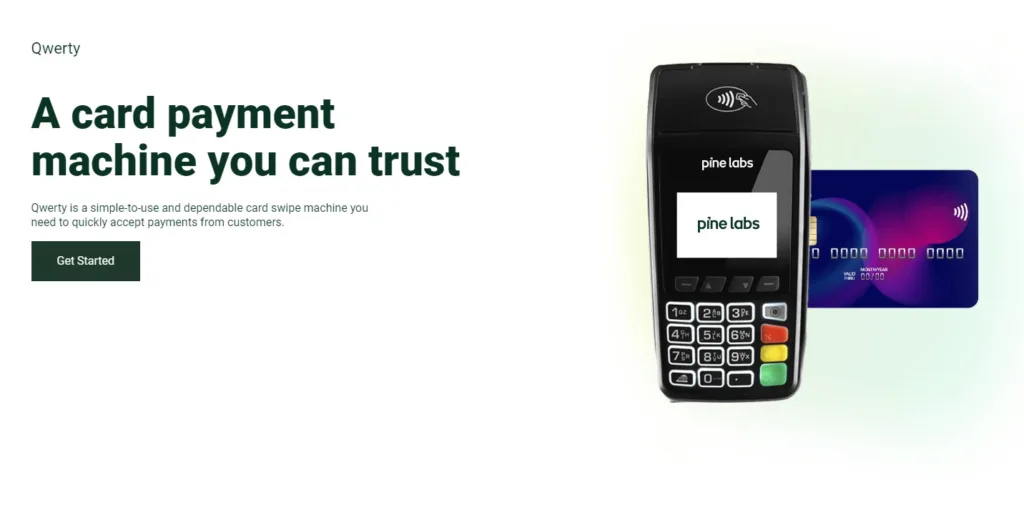Customers often come to small businesses to get a personal and thoughtful in-store experience that large retailers can’t offer. The checkout process is vital to this experience and becomes a competitive differentiator for small merchants.
The PoS payments market in India is projected to grow by 15.15% (2024-2028), resulting in a market volume of US$71.80bn in 2028. Small yet powerful PoS machines are designed to fit into any space. Retailers can use these PoS machines to accept payments from over 100+ modes.
Learn about the factors influencing point of sale machine price and understand how it is a good fit for your business.
How much does a PoS machine cost?
Before understanding the factors influencing point of sale machine price, it becomes important to understand the overall cost of the PoS machine.
Pricing varies from one PoS provider to another. Some offer free subscriptions, paid subscriptions with more advanced features, or custom pricing on a business-by-business basis.
A robust PoS system quickly pays for itself through increased efficiency, sales volumes and insights. But to avoid buyer’s remorse, you need to evaluate your needs and budget.
Factors that influence point of sale machine price
Point of sale (PoS) machines serve as vital tools for businesses, facilitating transaction processing and inventory management.
While the upfront cost of acquiring a PoS system is crucial, it’s just one aspect influencing the total expense of employing such a machine.
In this discussion, we’ll delve into the various factors that influence the point of sale machine price, going beyond its initial cost.
- Hardware and software expenses
The most significant outlay when investing in a PoS machine pertains to hardware and software costs.
Hardware expenditure can vary widely, ranging from a modest sum to a substantial investment, contingent on factors such as features, brand reputation and product quality.
Equally significant are software costs, which significantly impact the point of sale machine price
- Maintenance and repair outlays
Ongoing maintenance and repair expenses are critical considerations for businesses acquiring a PoS machine. As with any technology, PoS systems may encounter glitches or breakdowns, necessitating maintenance or repair.
While some vendors offer warranties or service contracts to mitigate these costs, it’s essential to scrutinise the terms of such agreements to grasp the level of assistance provided and any associated charges
- Credit card processing fees
Another factor influencing point of sale machine price is the expenses linked with credit card processing.
Payment processors levy charges on merchants for processing credit and debit card transactions, with fees varying based on factors like card type, transaction volume and processing method.
Typically, businesses can anticipate paying approximately 2% of the transaction value in fees (contact customer support for custom pricing).
Opting for a payment processor offering competitive rates and transparent fee structures is imperative to curtail these costs
- Integration capability
The ability of a PoS system to integrate with other business systems is another factor influencing its cost.
For instance, businesses utilising accounting software may necessitate integration with their PoS system for precise financial reporting.
Integration may call for additional hardware, software or professional services, thereby augmenting the overall system cost
- Training and support expenditure
Training and support expenses, though often overlooked during PoS system acquisition, can be substantial.
Effective system utilisation and troubleshooting necessitate training for business owners and staff.
It’s imperative to select a vendor providing comprehensive training and support services to mitigate these expenses
- Customisation and scalability
The capacity for customisation and scalability also influence the point of sale machine price.
Tailoring the system to specific business requirements may entail additional software development or professional services, thus increasing the overall expenditure.
Likewise, businesses intending to expand or diversify may require a scalable PoS system capable of accommodating their evolving needs, potentially necessitating additional investment in hardware or software
- Data security and compliance costs
Data security and compliance are other important factors impacting the cost of employing a PoS machine.
Businesses processing credit card payments must adhere to PCI DSS, which mandates measures for securing cardholder data.
Achieving PCI DSS compliance may necessitate additional investment in hardware, software or professional services, thereby augmenting the total system cost
- Business locations
Ultimately, the price of a PoS system may fluctuate based on location. Certain providers refer to this as the number of outlets or the inclusion of multi-store management capabilities.
If your business operates across multiple locations, it’s crucial to choose a plan that accommodates this dispersed setup
Invest in your business’s success
Choosing the right PoS system is an investment in the future of your business. Remember, it’s not just about the initial cost; consider the long-term value the system will bring to your business.
Research different options, compare features and pricing plans that influence point of sale machine price, and don’t hesitate to ask vendors questions.
A PoS system from a leading merchant platform like Pine Labs is more than just a fancy cash register. It’s a powerful tool that can streamline your operations, improve customer experience and boost your bottom line.








Leave a Comment
You must be logged in to post a comment.